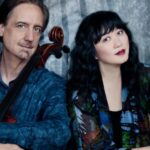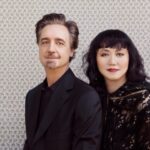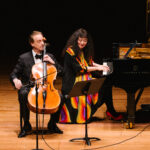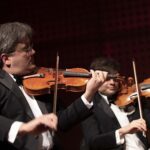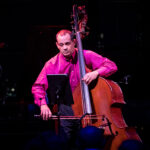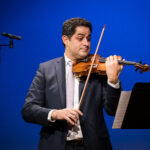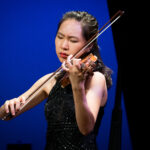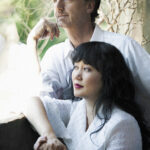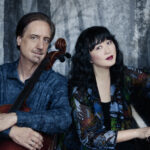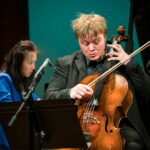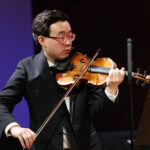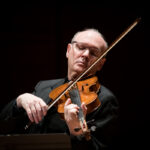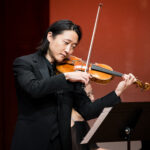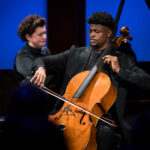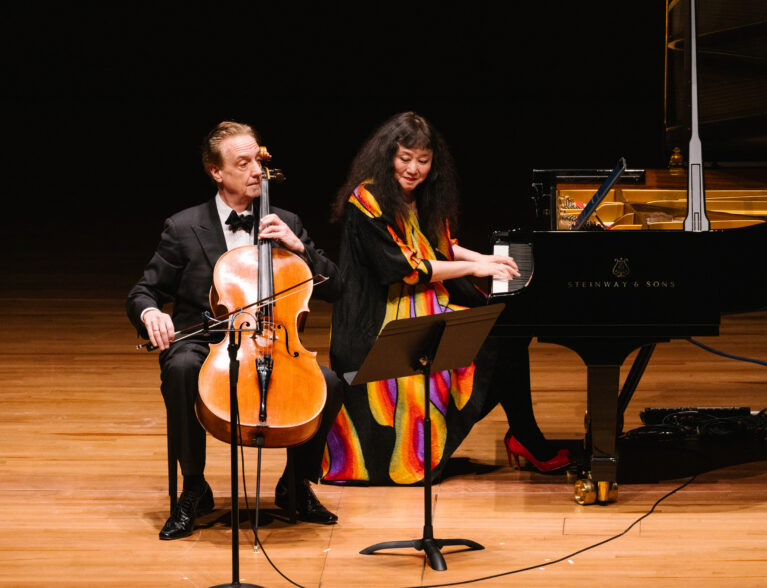
Vero Beach audiences can look forward to another season of outstanding chamber music with the return of the Chamber Music Society of Lincoln Center. The three-concert series will take place at Trinity Episcopal Church beginning Jan. 30. Founded in 1969 and renowned for its performance, education and broadcast accomplishments, the CMS has been led by co-artistic directors David Finckel, cellist, and Wu Han, pianist, since 2004.
The CMS presents a full season of concerts at Alice Tully Hall in the Lincoln Center for the Performing Arts complex and has a touring schedule that includes 13 U.S. cities and occasional performances in Europe and Asia. They also utilize the Daniel and Joanna S. Rose Studio in New York City for recitals, lectures, family programs and broadcast programs.
“It’s a large, large ship. It’s really just so much reach. It’s the most complicated puzzle that you can imagine,” says Wu Han.
“Since we are the flagship of chamber music, and the largest chamber music producer in North America, in the world actually, we figured we would like to share with everybody. It’s very, very exciting.”
The CMS also runs the robust Bowers Program, a competitive three-year residency program for gifted, up-and-coming ensembles and individuals.
“It brings in all of the most exciting young hotshot musicians to join us on stage, so the energy on that stage is just really unbelievable. It’s lots of fun to be able to bring all this great music everywhere. It’s a really good thing,” says Wu Han, who is excited to return to Vero.
“I love Vero. I think it’s just one of the most extraordinary places. We have made so many great friends and that makes me very, very happy. We were so pleased that we formed this partnership with the church. It was just packed; they were saying they’d never seen so many people.”
After their initial concert at Trinity Church last year, she says audience members informed them that the sightline wasn’t ideal, so they paid to have a stage built.
“Immediately everything improved, so I was very, very pleased. Those things are important. I’m just really delighted that we can have a residency in Vero Beach and that we can bring you such great chamber music.”
Wu Han adds that they were also able to perform a few outreach concerts in the Windsor and John’s Island communities that were equally well attended.
Because their scope is so large, she says a signature CMS feature is their ability to offer considerable variety in their programming, as evidenced by the upcoming 2025 Concert Series.
Program One, Jan. 20: All Felix Mendelssohn
Sonata in F major for Violin and Piano
Sonata in D major for Cello and Piano
Trio No. 2 in C minor for Piano, Violin, and Cello
Performed by: Wu Han, piano; David Finckel, cello; and Julian Rhee, violin.
“The Mendelssohn program will be a violin sonata, a cello sonata and a piano trio. It’s one of the most virtuosic programming; I want to really show off my masters. Each program is designed a little differently,” Wu Han explains.
“It’s an all Mendelssohn program. This is really for people that know the repertoire and love classical music; they will pick it up right away. Mendelssohn, of course, is most beloved as well.”
Program Two, Feb. 20: Mozart and Mendelssohn
Wolfgang Amadeus Mozart – Duo in G major for Violin and Viola
Felix Mendelssohn – Quintet No. 1 in A major for Two Violins, Two Violas, and Cello
Wolfgang Amadeus Mozart – Quintet in C major for Two Violins, Two Violas, and Cello
Performed by: Richard Lin, violin; Danbi Um, violin; Aaron Boyd, violin; Paul Neubauer, viola; and Jonatha Swensen, cello.
This program, she says, is highlighted by string quintets by Mozart and Mendelssohn.
“We call it a Mendelssohn sandwich. In the middle, you hear a completely different approach, even with the same instrumentation. The second piece is less played and so it’s much more for everybody to discover. The quintet is so beautiful,” she says.
“And then we will finish with the Mozart quintet, so you can hear the difference between two major composers. It’s just a very different approach.”
Program Three, March 13: Schubert’s Trout Quintet
Wilhelm Friedemann Bach – Fugue in F minor for Violin, Viola and Cello
Wolfgang Amadeus Mozart – Adagio and Fugue in C minor for Strings
Wolfgang Amadeus Mozart – Quartet in E-flat major for Piano, Violin, Viola, and Cello
Franz Schubert – Quintet in A major for Piano, Violin, Viola, Cello, and Bass, “Trout”
Performed by: Wu Han, piano, Julian Rhee, violin; Arnaud Sussmann, violin; Paul Neubauer, viola; Sterling Elliott, cello; and Anthony Manzo, double bass.
“For the third program, we decided to go from Bach to Mozart and to Schubert. It’s all the most singing music. The Mozart Piano Quartet E-flat Major is like a small piano concerto, basically,” says Wu Han.
She explains that Mozart actually wrote two piano quartets.
“His first one was a G minor one. His publisher said, ‘This is too hard for any amateur pianist to play. We’ll cancel the commission.’ And Mozart went home so mad, and he just said, ‘I’m going to write one even harder.’ So he wrote this one, just to protest.”
As Mozart and Mendelssohn each admired and studied Bach fugues, she said they added one to this program.
“We figured we’d put a Bach in there just to warm up your ear and to really understand the construction of all these incredible pieces. And then of course Schubert is the king of all of the German songs, and the Trout Quintet is always a most beloved program. The Trout is not only going to Vero, but it’s also going to 13 programs.”
She explains that it was written for a friend’s country party, which was to be attended by a bass player, violinist, violist, cellist, and himself as pianist.
“So he wrote this piece, actually, just to please the host, and it’s a very unusual combination,” says Wu Han.
“It immediately became a most popular piece, not only among the players, but also among all the listeners. By the time they get to the fourth movement, everybody just starts to smile. So that’s why every time you put the Trout on tour, you get booked.”
As an aside, Wu Han shares that she visited the home outside Vienna and was given an opportunity to play the piano used by Schubert when he premiered the piece.
The artists Vero audiences will hear are all exceptional, award-winning musicians.
“I can’t tell you how happy I am about the unbelievable artists I have. I mean, they’re just extraordinary, all of them. If I dare to say one is better than the other, it’s like telling you that I like my son better than my daughter. It’s not going to work,” says Wu Han.
Audiences will recognize some as having played here previously.
“That’s another thing I tell the audience all the time. They should get to know all the artists, because usually when people play chamber music, they are really fun-loving, filled with a sense of humor, really likable, very social and very sensitive, because those are the traits to really succeed in chamber music,” she says.
“I think that sense of love and energy is why audience increases are happening everywhere. All of the 12 cities that we started, Vero is the youngest one, the halls are just packed. So, it’s really wonderful for us to do that and to add this one extra stop in Vero Beach.”
For more information, visit ChamberMusicSociety.org.
Photos provided

